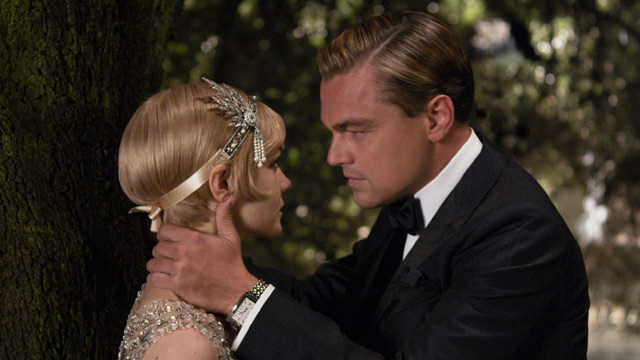
The Great Gatsby - Chapter 5
Foreshadowing
'. . . we take a plunge in the swimming-pool? I haven't made use of it all summer'

Fritzgerald uses foreshadowing to create ambiguity for future events, '". . . we take take a plunge in the swimming-pool? I haven't made use of it all summer"'. This isn't the only time Gatsby says this in the book which adds a subtle dramatic climax up to the final event in the swimming pool. This makes Gatsby death even more ironic as this is the only time he 'made use of' his swimming pool. Fritzgerald hints that something is going to happen involving the swimming pool but it is not yet clear what, which builds the ambiguity as different readers guess different outcomes.

'"Don't bring Tom," I warned her.'
Here, Fritgerald uses foreshadowing to hint at Gatsby and Daisy's affair. '"Don't bring Tom," I warned her.' Readers wonder if this will become a regular thing for Daisy to not 'bring Tom'. However the time she does bring Tom there is chaos and tragedy so is it for better or for worse?
'Luckilythe clock took this moment to tilt dangerously at the pressure of his head'

I think this is important in the guessing game of who Gatsby is because although he acts likes a gentleman and has manners, it shows the readers that he too is clumsy and also has these awkward moments. This bring readers to realise that he isn't a flash as it seems, consequentlywe expect more of these slips of the character he is trying to portray.
'"Are you in love with me," she said low in my ear, "or why do I have to come alone?"
Foreshadows the fact that someone is in love with her
Place/setting
"The front door opened nervously"
Fitzgerald personifies the door, so it reflects the nervous feelings of Gatsby before he meets Daisy again, and gives the reader the impression of the atmosphere, and how tense/nervous it is.

"the day agreed upon pouring rain"
The rain in chapter 5 can be seen as a pathetic fallacy "the day agreed upon pouring rain", the day cannot actually agree to anything, but Fitzgerald attributes this characteristic to the day/rain. The "pouring" rain, and the connotations it holds can also be argued to foreshadow that something bad could happen.
"it's stopped raining"
"there were twinkle bells of sunshine in the room"
Fitzgerald uses the idea of the rain stopping to reflect how the situation between Gatsby and Daisy has changed. For example, the tension between the two of the ends, and the phrase 'twinkle bells of sunshine' can be argued to reflect how happy they are with one another/ how happy and relaxed the atmosphere seems.

"my house looks well, doesn't it?"
"that huge place there?"
Fitzgerald makes it seem as though for Gatsby, Daisy seeing his house is almost a dramatic climax, in that he's waited five years for her to see it. Also, for Gatsby it would seem that proving his wealth and status is very significant, as it is almost his way of ensuring he'll have a chance with Daisy. Daisy's tone in her response is also important as it highlights how impressed she is with Gatsby's wealth.
Dramatic Climax
"Possibly it had occured to him that the colossial significance of that light had now vanished forever"
This quote could signify that Gatsby finally realises that Daisy will never be truly his again, her love for him has "vanished" like the light signifying love
"I think he hardly knew what he was saying, for when I asked him what business he was in he answered, "That's my affair," before he realized that it wasn't the appropriate reply."
Gatsby may lie a lot, but he's not very good at it—and that, in Nick's eyes, makes him more honest than half the fakers who come to his parties.
"There must have been moments even that afternoon when Daisy tumbled short of his dreams – not through her own fault, but because of the colossal vitality of his illusion."
Gatsby's vision of Daisy is way better than the real Daisy. Maybe this is one reason she ends up with Tom—she knows she can't ever live up to who she was for him.
"For half a minute there wasn't a sound"
This builds tension for the reader because Daisy and Gatsby haven't seen each other for years.
Voice
Gatsby's voice throughout the Chapter is somewhat subdued and there seems to be a nervous tone to it throughout, particularly when he is meeting Daisy. He speaks "hollowly" to Nick beforehand, which contrasts to how Fitzgerald previously presented him. The contrast makes it clear to the reader just how significant an aspect Daisy is to his life and it is clear that the use of "old sport" as what seems like an afterthought is something of a pretence, one which he is finding hard to keep up at this moment.
" 'Of course, of course! They're fine!' and he added hollowly, '... old sport.' "
" 'We've met before,' muttered Gatsby."
However, when Gatsby and Daisy have been reunited, Gatsby's tone changes considerably. He seems to regain his composure, though at one point he does appear to lose this through laughter. Yet in general, the air of authority that previously seemed to surround himhas returned and is notable when he all but demands that Klipspringer play the piano. It seems that when Gatsby is surrounded by Daisy, he is invincible, he is powerful, yet when Daisy is taken away from him. he once again becomes vulnerable, which ultimately leads to his downfall in the latter chapters.
" 'It's the funniest thing, old sport,' he said hilariously. 'I can't - When I try to - ' "
" 'Klipspringer plays the piano,' said Gatsby, cutting him off. 'Don't you, Ewing, old sport?' "
" 'My house looks well, doesn't it?' he demanded. 'See how it the whole front of it catches the light.' "
Fitzgerald's use of voice is important in this Chapter, as this is a significant chaper in itself and the way that he presents the characters is significant. The way that Gatsby's tone alters almost immediately after he is reunited with Daisy - after the initial tension has dissolved, is crucial, in that it is clear to the reader just how much of an impact Daisy has on his life and this factor is very significant in the development of future chapters. However, in some instances, Fitzgerald makes it clear that Gatsby is hiding something and these subtle nuances are emphasised by the change in Gatsby's tone, and hint at the wider picture regarding Gatsby's fortune.
" 'Look at this,' said Gatsby quickly. 'Here's a lot of clippings - about you.' "
When Daisy is reunited with Gatsby, Fitzgerald describes Daisy's voice as ringing "on a clear artificial note". This suggests to the reader that Daisy's actual approach to Gatsby is not quite real - and considering it has been five years since they've seen one another is understandable. Though once Nick leaves and returns, Daisy seems less artificial and more comfortable in Gatsby's company although her voice suggests to the reader that she is more impressed by the money of Gatbsy's, rather than the man himself.
" 'That huge place there?' she cried pointing.
He fumbled with a series of beginnings.
Time
"Two o'clock and the whole corner of the peninsula was blazing with light"
This uses a specific time reference which adds to the description as we learn that it is in the early hours of the morning even though he previously says "that night".
"He considered for a moment"
Throughout this chapter the time is spaced out with things going at a steady space. This could be portraying Gastbys nervousness as he hesitates to make contact with Daisy and inform Nick of his true nitentions.
"i havent made use of it all summer"
Gatsby uses time to describe the low amount of use of his swimming pool. The way he says "all sumer" describes that he is at the end of a long time period which in similar to how he is coming to the end of his time. So hints at how both things that have lasted a while end in the same way at the same momment as Gatsby is killed while using the swimming pool.
Ambiguity

Do Gatsby and Daisy know each other?
How do Gatsby and Daisy know each other?
Why does Gatsby want to meet Daisy?
What is Gatsby's job/business?

What past do Daisy and Gatsby have?
